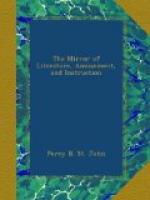were placed at regular distances expressly to prevent
separation. One party was frequently heard hallowing
from an apparently fathomless ravine, to their comrades
passing over some high projecting summit, to know
if they were going right. These would answer with
their trumpets; but it often occurred that both parties
had lost their road. The frequent sound of trumpets
along the broken line—the shouting of officers
to their men at a distance—the neighing
of horses, and the braying of mules, both men and
animals being alike anxious to reach a place of rest,
produced a strange and fearful concert, echoed, in
the darkness of the night, from the horrid solitude
of the Andes. After many fruitless attempts to
discover the proper route, a halt until daybreak was
usually the last resource. The sufferings of
the men and animals on those occasions were extreme.
The thermometer was generally below the freezing point,
amidst which they were sometimes overtaken by terrific
snow-storms. These difficulties and hardships
were not so severely felt by the infantry, for, unincumbered
with the charge of horses, it was an easy matter for
them to turn back, whereas it was often impossible
for the cavalry to do so, the path on the mountain-side
being generally too narrow to admit of horses turning
round. It happened more than once, that the squadron
in front, having ascertained that it had taken a wrong
direction, was nevertheless compelled to advance until
it reached some open spot, where the men were enabled
to assemble, and wait for the hindmost of their comrades,
and then retrace their steps. After having pursued
this plan, the troops have met another squadron following
the same track; and, under such circumstances, it
has required hours for either to effect a countermarch.
In this complicated operation many an animal was hurled
down the precipice and dashed to pieces, nor did their
riders always escape a similar fate.
In the mountainous regions of the interior, nature
presents difficulties which, though of a different
description, are equally as appalling as those experienced
on the coast. The sheds erected at pascanas
(or halting places) in the vast unpeopled tracts of
the bleak mountain districts, and on the table lands,
were inadequate to afford shelter to more than a small
number, so that the greater part of the troops were
obliged to bivouac sometimes in places where the thermometer
falls every night considerably below the freezing
point, and this throughout the year; whereas
it often rises at noon, in the same place, to 90 degrees.
It may be readily imagined what must have been the
sufferings of men, born in, or accustomed to, the sultry
temperature of Truxillo, Guayaquil, Panama, or Cartagena.
The difficulty of respiration, called in some places
la puna, and in others el siroche, experienced
in those parts of the Andes which most abound in metals,
was so great at times, that, whilst on the march,
whole battalions would sink down, as if by magic,
and it would have been inflicting death to have attempted
to oblige them to proceed until they had rested and
recovered themselves. In many cases life was
solely preserved by opening the temporal artery.
This sudden difficulty of respiration is supposed to
be caused by occasional exhalations of metalliferous
vapour, which, being inhaled into the lungs, causes
a strong feeling of suffocation.




